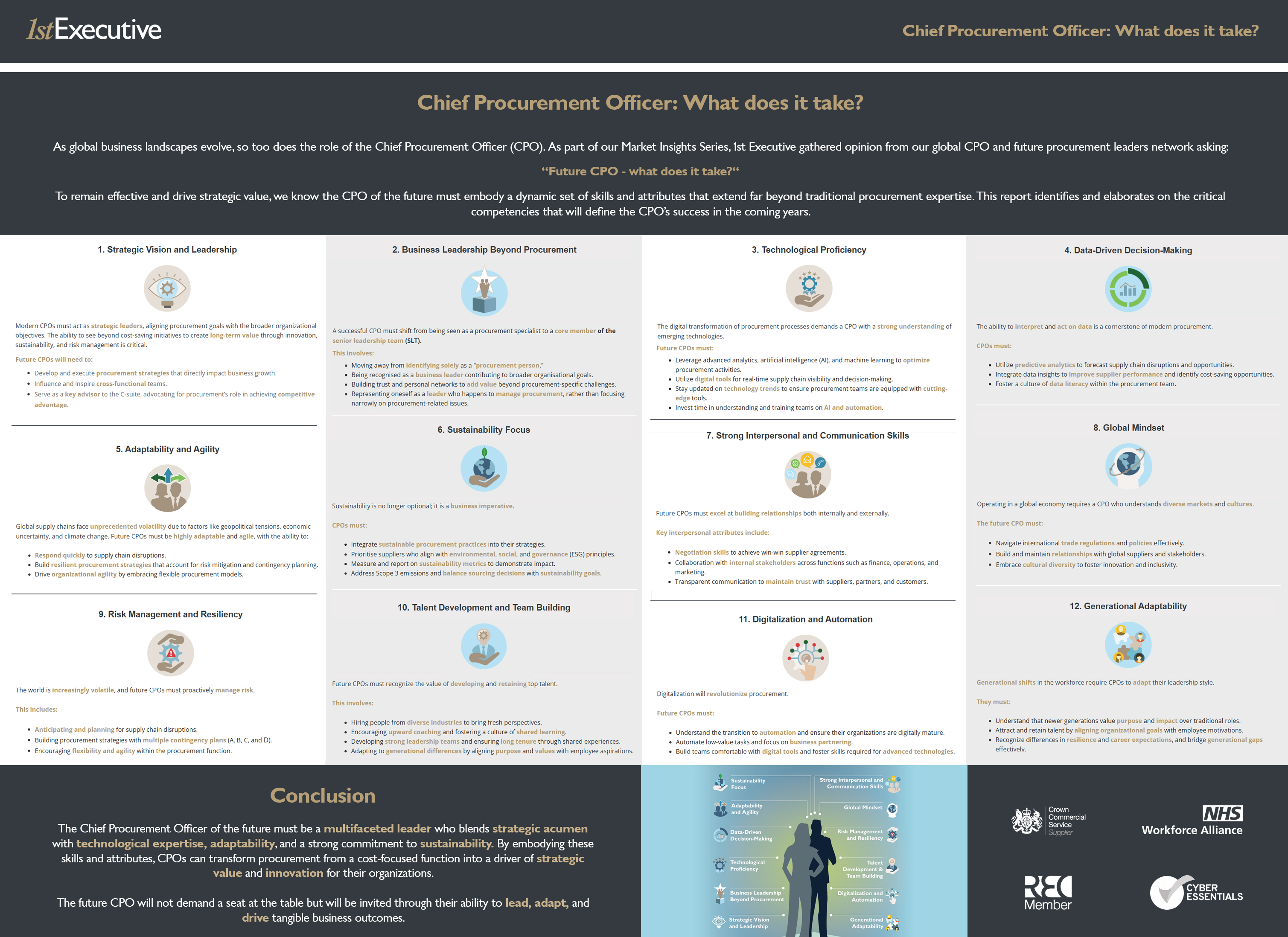February 2025 - CPO of the future; what does it take?

Chief Procurement Officer of the Future: Key Skills and Attributes
As global business landscapes evolve, so too does the role of the Chief Procurement Officer (CPO).
As part of our Market Insights Series 1st Executive gathered opinion from our global CPO and future procurement leaders network asking, “Future CPO what does it take? “
To remain effective and drive strategic value, we know the CPO of the future must embody a dynamic set of skills and attributes that extend far beyond traditional procurement expertise. This report identifies and elaborates on the critical competencies that will define the CPO’s success in the coming years.
1. Strategic Vision and Leadership:
Modern CPOs must act as strategic leaders, aligning procurement goals with the broader organizational objectives. The ability to see beyond cost-saving initiatives to create long-term value through innovation, sustainability, and risk management is critical. Future CPOs will need to:
• Develop and execute procurement strategies that directly impact business growth.
• Influence and inspire cross-functional teams.
• Serve as a key advisor to the C-suite, advocating for procurement’s role in achieving competitive advantage.
2. Business Leadership Beyond Procurement:
A successful CPO must shift from being seen as a procurement specialist to a core member of the senior leadership team (SLT). This involves:
• Moving away from identifying solely as a "procurement person."
• Being recognized as a business leader contributing to broader organizational goals.
• Building trust and personal networks to add value beyond procurement-specific challenges.
• Representing oneself as a leader who happens to manage procurement, rather than focusing narrowly on procurement-related issues.
3. Technological Proficiency:
The digital transformation of procurement processes demands a CPO with a strong understanding of emerging technologies. Future CPOs must:
• Leverage advanced analytics, artificial intelligence (AI), and machine learning to optimize procurement activities.
• Utilize digital tools for real-time supply chain visibility and decision-making.
• Stay updated on technology trends to ensure procurement teams are equipped with cutting-edge tools.
• Invest time in understanding and training teams on AI and automation.
4. Data-Driven Decision-Making:
The ability to interpret and act on data is a cornerstone of modern procurement. CPOs must:
• Utilize predictive analytics to forecast supply chain disruptions and opportunities.
• Integrate data insights to improve supplier performance and identify cost-saving opportunities.
• Foster a culture of data literacy within the procurement team.
5. Adaptability and Agility:
Global supply chains face unprecedented volatility due to factors like geopolitical tensions, economic uncertainty, and climate change. Future CPOs must be highly adaptable and agile, with the ability to:
• Respond quickly to supply chain disruptions.
• Build resilient procurement strategies that account for risk mitigation and contingency planning.
• Drive organizational agility by embracing flexible procurement models.
6. Sustainability Focus:
Sustainability is no longer optional; it is a business imperative. CPOs must:
• Integrate sustainable procurement practices into their strategies.
• Prioritize suppliers who align with environmental, social, and governance (ESG) principles.
• Measure and report on sustainability metrics to demonstrate impact.
• Address Scope 3 emissions and balance sourcing decisions with sustainability goals.
7. Strong Interpersonal and Communication Skills:
Future CPOs must excel at building relationships both internally and externally. Key interpersonal attributes include:
• Negotiation skills to achieve win-win supplier agreements.
• Collaboration with internal stakeholders across functions such as finance, operations, and marketing.
• Transparent communication to maintain trust with suppliers, partners, and customers.
8. Global Mindset:
Operating in a global economy requires a CPO who understands diverse markets and cultures. The future CPO must:
• Navigate international trade regulations and policies effectively.
• Build and maintain relationships with global suppliers and stakeholders.
• Embrace cultural diversity to foster innovation and inclusivity.
9. Risk Management and Resiliency:
The world is increasingly volatile, and future CPOs must proactively manage risk. This includes:
• Anticipating and planning for supply chain disruptions.
• Building procurement strategies with multiple contingency plans (A, B, C, and D).
• Encouraging flexibility and agility within the procurement function.
10. Talent Development and Team Building:
Future CPOs must recognize the value of developing and retaining top talent. This involves:
• Hiring people from diverse industries to bring fresh perspectives.
• Encouraging upward coaching and fostering a culture of shared learning.
• Developing strong leadership teams and ensuring long tenure through shared experiences.
• Adapting to generational differences by aligning purpose and values with employee aspirations.
11. Digitalization and Automation:
Digitalization will revolutionize procurement. Future CPOs must:
• Understand the transition to automation and ensure their organizations are digitally mature.
• Automate low-value tasks and focus on business partnering.
• Build teams comfortable with digital tools and foster skills required for advanced technologies.
12. Generational Adaptability:
Generational shifts in the workforce require CPOs to adapt their leadership style. They must:
• Understand that newer generations value purpose and impact over traditional roles.
• Attract and retain talent by aligning organizational goals with employee motivations.
• Recognize differences in resilience and career expectations, and bridge generational gaps effectively.
Conclusion:
The Chief Procurement Officer of the future must be a multifaceted leader who blends strategic acumen with technological expertise, adaptability, and a strong commitment to sustainability. By embodying these skills and attributes, CPOs can transform procurement from a cost-focused function into a driver of strategic value and innovation for their organizations. The future CPO will not demand a seat at the table but will be invited through their ability to lead, adapt, and drive tangible business outcomes.
